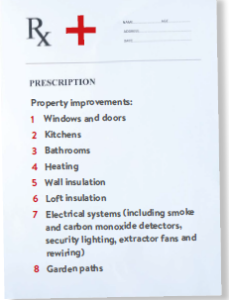Liz Zacharias, Senior Consultant at Campbell Tickell, discusses the findings from a study carried out by The Department for Public Health and Policy at the University of Liverpool. This study is a comprehensive analysis of the impact of home upgrades on healthcare.
The Department for Public Health and Policy at the University of Liverpool investigated the use of emergency health services for cardio-respiratory conditions and injuries among social housing tenants in Wales aged 60-plus, where their homes had been improved, over a 10-year period.
The study published in the British Medical Journal in June 2018 found that residents aged 60 or over, who were living in homes where improvements had been made were associated with 39% fewer admissions, than those living in homes that were not upgraded.
This study is important, not just because it makes the case for home improvement like the Decent Homes Standard and the Welsh Housing Quality Standard in this case, but because it does so over a 10-year period and takes account of eight different property improvements (see box: Prescription).
The study used different anonymised data sets and over the 10-year study 32,009 tenant participants were included. More than 45% of these being associated with the same home over the whole period. They studied three groups – one of which was a reference group (a control group where no home improvements were made).
 Fewer admissions
Fewer admissions
Some interesting findings include:
1. a 57% reduction in emergency admissions for respiratory conditions when electrical systems were upgraded;
2. a 29% reduction in emergency admissions where windows and doors had been improved;
3. a reduction in emergency admissions for cardio-respiratory conditions and injuries and a decrease in admissions for fall and burn injuries.
An important study
This is the most comprehensive analysis to date of a national programme of home upgrades and its impact on healthcare use. Differently, it is carried out by an academic institution, not a housing provider’s evaluation of its own initiative, some of which have been criticised in the past.
The researchers state that they believe this study provides evidence of the health benefits derived from improvements in social housing and should be considered evidence for encouraging greater integration between housing, health and the social care system
Greater integration
From a housing point of view, this study makes the case for greater integration in a way that is meaningful to health systems and is a useful addition to the evidence base for the benefits of health and housing integration.
The NHS Long-Term Plan places emphasis on creating Integrated Care Systems that will focus on addressing population health as part of a wider attempt at creating a more preventative healthcare system. The evidence here shows that investment in improving housing stock could be a key contributor to the NHS’s ambitions for the future of our healthcare system.
To find out more, contact Liz Zacharias : liz.zacharias@campbelltickell.com
This article first appeared in CT Brief- Issue 41



